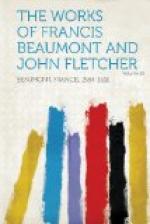of Parnassus by the Penne And your just Judgements
of his worth, that have Preserved this Authours
mem’ry from the Grave, And made it glorious;
let me, at your gate, Porter it here, ’gainst
those that come too late, And are unfit to enter.
Something I Will deserve here: For where you
versifie In flowing numbers, lawfull Weight, and
Time, I’ll write, though not rich Verses,
honest Rime. I am admitted. Now, have
at the Rowt Of those that would crowd in, but must
keepe out. Beare back, my Masters; Pray keepe
backe; Forbeare: You cannot, at this time,
have entrance here. You, that are worthy, may,
by intercession, Finde entertainment at the next
Impression. But let none then attempt it, that
not know The reverence due, which to this shrine
they owe: All such must be excluded; and the
sort, That onely upon trust, or by report Have
taken Fletcher up, and thinke it trim To
have their Verses planted before Him: Let them
read first his Works, and learne to know him, And
offer, then, the Sacrifice they owe him. But
farre from hence be such, as would proclaim Their
knowledge of this Authour, not his Fame; And
such, as would pretend, of all the rest, To be the
best Wits that have known him best. Depart
hence all such Writers, and, before Inferiour ones,
thrust in, by many a score, As formerly, before
Tom Coryate, Whose Worke before his Praysers
had the Fate To perish: For the Witty Coppies
tooke Of his Encomiums made themselves a
Booke. Here’s no such subject for you to
out-doe, Out-shine, out-live (though well you may
doe too In other Spheres:) For Fletchers flourishing
Bayes Must never fade while Phoebus weares
his Rayes. Therefore forbeare to presse upon
him thus. Why, what are you (cry some) that
prate to us? Doe not we know you for a flashy
Meteor? And stil’d (at best) the
Muses Serving-creature? Doe you comptroll?
Y’have had your Jere: Sirs, no; But,
in an humble manner, let you know Old Serving-creatures
oftentimes are fit T’ informe young Masters,
as in Land, in Wit, What they inherit; and how well
their Dads Left one, and wish’d the other
to their Lads. And from departed Poets I can
guesse Who has a greater share of Wit, who lesse.
’Way Foole, another says. I, let him raile,
And ’bout his own eares flourish his Wit-flayle,
Till with his Swingle he his Noddle breake; While
this of Fletcher and his Works I speake:
His Works (says Momus) nay, his
Plays you’d say: Thou hast said right,
for that to him was Play Which was to others braines
a toyle: with ease He playd on Waves which
were Their troubled Seas. His nimble Births
have longer liv’d then theirs That have, with
strongest Labour, divers yeeres Been sending forth
[t]he issues of their Braines Upon the Stage;
and shall to th’ Stationers gaines
Life after life take, till some After-age Shall
put down Printing, as this doth the Stage;




